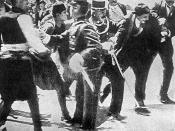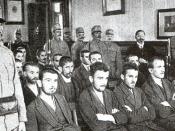'No single country deserves the blame for the outbreak of war in 1914.' Do you agree? Argue your case.
In 1914 the world embarked on the greatest conflict ever know to humanity. Although World War One was triggered by a chain of events unleashed by the assassination of Archduke Franz Ferdinand on June 28, the wars origins go deeper, involving national politics, cultures, economics and a complex web of alliances and counterbalances that developed between the various European powers over the course of the 19th Century. Following the assassination it took less than five weeks for the world to be at war. In these conditions it is difficult to argue that one single country can be blamed for the outbreak of war.
During the 19th century, a number of alliances were signed between countries in Europe. The most important of these were the dual alliance (German and Austria-Hungary), the dual entente (France and Russia), the triple entente (France, Russia and Britain) and the neutrality pact (Belgium and Britain).
These alliances were primarily defensive meaning that they would support each other in the occurrence of an attack but not an offensive situation. These alliances meant that if one country attacked another, most of Europe would become involved and this would escalate into a world war. Mobilisation by a small country would have a cascading effect that would rapidly run out of control, involving every country.
Following the assassination of Archduke Franz Ferdinand on June 28, Austria-Hungary issued Serbia with an ultimatum stating that 'The Black Hand' must be eliminated, the perpetrators of the assassination be arrested and handed over and Serbia would allow Austria-Hungary troops into their country. When Austria-Hungary gave Serbia this ultimatum they expected Serbia to refuse and that gave Austria-Hungary a pretext for waging war. At the...


